

Stress, Sleep, and Coping Mechanisms CRIS, Azusa Pacific University John Vernon, Payson Marsh, Abel De Castro S
Introduction S The purpose of this study is to investigate correlations between stress levels and quality/quantity of sleep. It will also examine the relationships between lifestyle choices and methods for coping with stress. S This study is important, because it will further develop the field of science studying the correlations between sleep and stress. We also are studying the correlations between spirituality and sleep quality. Including spirituality brings a holistic understanding to health, specifically surrounding sleep health.
Research Questions S What happens when the evolutionary “fight or flight” response to a threat stimulus is suppressed? S How do adrenaline, serotonin and dopamine levels relate to mental states of anxiety and serenity/restfulness? S What factors stimulate and regulate adrenaline, serotonin and dopamine levels in the body?
Research Questions Continued S What are the connections between levels of stress and sleep quality/quantity? S What lifestyle choices and practices can contribute to reducing anxiety and improving sleep quality/quantity? S How does the accumulation of sleep debt contribute to anxiety and serenity/restfulness?
Hypothesis S Our hypothesis is that stress levels affect sleep quality, in regards to the constructs perceived stress, and personality type. We predict that there will be an inverse correlation between stress levels and sleep quality, and neuroticism and sleep quality.
Objectives S Find the correlations that contribute to sleep disturbance within individuals S As Christians it is our concern to be holistically aware of our health and the negative and positive consequences of our habits S We hope to further elaborate within the research field of sleep quality in relation to health and spirituality
Research Methods S The sample group for this study will be a group of students from Azusa Pacific University. We will be using a series of questionnaires to determine personality type, and lifestyle choices in relation to sleep quality. First the big five personality test will be used to determine aspects of personality relating to stress. Second, the Pittsburg sleep quality index will be used to understand self-perceived sleep quality, as well as a sleep disturbance application for smartphones for subjects to measure sleep disturbances, such as restlessness. There also may be questionnaires to understand lifestyle categories, such as exercise, meditation, and other coping methods. These surveys will be done through a psychology class at Azusa Pacific University.
Literature Review 1. Stress S Higher levels of physiological and psychological stress increase sleep disturbance among individuals(1). S Stress causes hyperarousal, which is a direct contributing factor to insomnia(2).
Continued… 2. Neuroticism and Agreeableness S People who score high on neuroticism experience poor sleep quality(3). S People who score highly on agreeableness experience high sleep quality(4). -Philippians 4:4-8 S Neuroticism also is correlated with emotional control. Subjects who work harder with emotional control experience sleep disturbances(5).
Continued… 3. Meditation S Increase quality of sleep physiologically: S Regulates the parasympathetic nervous (Resting) system and reduces sympathetic nervous (Stimulating) system activity(6). S Meditation done late at night before sleeping increases the levels of plasma melatonin in subjects(7).
Continued… 4. Exercise Light exposure helps to regulate our circadian sleep rhythms by S interacting with our biological clocks. Poor exposure to light can cause sleep disturbance as our chronotype is S changed by light exposure. Exercise can be beneficial for the circadian rhythm, because when done outside our exposure to bright light is increased, which regulates our sleep rhythm. Exercise can be a coping method for neuroticism and anxious tendencies S that perpetuate sleep problems(8).
Continued… S 5. Caffeine Caffeine, Especially derived from coffee has an adverse effect on sleep S quality (9) Caffeine negatively effects sleep initiation as well as duration. S Generally the effects of caffeine will last for about 3-5 hours. S Caffeine in coffee tends to have a stronger effect on sleep quality than S caffeine from tea.
Additional Questions S How does exercise relate to adrenaline levels in relation to stress? How does this relate to a fight or flight response to traumatic experience? S How do serotonin levels in the body relate to quantity of sleep? How does exercise relate to serotonin levels in relation to stress?
Works Cited 1. Jarrin, D. Et al. (2014). The role of vulnerability in stress-related insomnia, S social support and coping styles on incidence and persistence of insomnia. European Sleep Research Society. 2. Kavey, N. (n.d.). Stress and Insomnia. Retrieved January 14, 2015, from S http://sleepfoundation.org/ask-the-expert/stress-and-insomnia 3. Hintsanen, M. Et al. (2014). Five Factor Personality Traits and Sleep: S Evidence from Two Population-based Cohort Studies. Health Psychology, 33(10), 1214-1223. 4. Duggan KA, Friedman HS, McDevitt EA, Mednick SC (2014) Personality S and Healthy Sleep: The Importance of Conscientiousness and Neuroticism. PLoS ONE 9(3): e90628. doi:10.1371/journal.pone.0090628
Works Cited 5. Preer, L. Et al. (2014). Personality Traits Associated with Sleep Initiation Problems. S Journal of Sleep Disorders: Treatment & Care, 3(1), 1-5. 6. Nagendra, R. P., Maruthai, N., & Kutty, B. M. (2012). Meditation and Its Regulatory S Role on Sleep. Frontiers in Neurology, 3, 54. doi:10.3389/fneur.2012.00054 7. Tooley G. A., Armstrong S. M., Norman T. R., Sali A. (2000). Acute increases in S night-time plasma melatonin levels following a period of meditation. Biol. Psychol. 53, 69 – 7810.1016/S0301-0511(00)00035-1 8. Spirduso, W . (2008). Exercise and sleep quality. In Exercise and its mediating effects S on cognition. Champaign, Ill.: Human Kinetics. 9. . Psychopharmacology, 2000, Volume 149, Number 3, Page 203 I. Hindmarch, U. S Rigney, N. Stanley, P. Quinlan, J. Rycroft, J. Lane
Recommend
More recommend